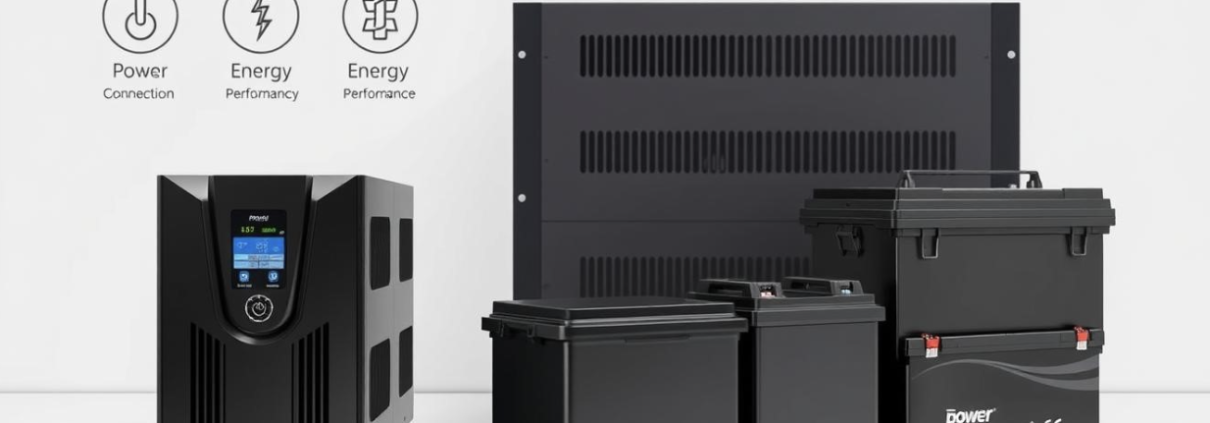UPS Battery Types: Discover the Best Fit for Your Requirements
In today’s world, having a reliable uninterruptible power supply (UPS) is key. It gives a battery backup to keep power going during outages. With more need for stable power in South Africa, knowing the UPS battery types is vital. The right UPS battery keeps your gear running when the power goes out.
Choosing the right UPS battery is crucial. There are many things to think about when picking one. The right UPS battery keeps your equipment safe and working. Knowing about the different UPS batteries helps you make a smart choice.
Key Takeaways
- Understanding the different types of UPS batteries is essential for making an informed decision.
- A suitable UPS battery provides the necessary power protection during outages.
- Choosing the right UPS battery type is vital to meet specific requirements.
- Efficient power protection is crucial for ensuring equipment safety and operation.
- A reliable uninterruptible power supply is crucial for businesses and individuals in South Africa.
- UPS batteries provide a battery backup to ensure continuous operation during power outages.
Understanding UPS Batteries and Their Critical Role
UPS systems are key for emergency and backup power during outages. At their core are UPS batteries, essential for uninterrupted power. Knowing their role and characteristics is vital.
In South Africa, power outages are common. UPS batteries are a must for businesses and homes. They ensure continuous operation and reduce downtime. When choosing a UPS battery, consider its type, capacity, and maintenance needs.
- Type of battery: Different types, like lead-acid and lithium-ion, have unique features and uses.
- Capacity: The battery’s capacity affects how long it can power as a backup.
- Maintenance requirements: Some batteries need regular care, while others are easy to maintain.
Understanding UPS batteries’ role in emergency and backup power helps make better choices. This ensures power supply without downtime and data loss risks.
Common UPS Battery Types Explained: Which is Best for Your Needs?
Choosing the right UPS battery is key. There are two main types: lead-acid and lithium-ion. Each has its own benefits and drawbacks to think about.
Lead-acid batteries have been a top pick for years. They’re reliable and affordable. But, they’re heavy, don’t last as long, and need regular care.
Lithium-ion batteries are newer and better in many ways. They pack more energy, last longer, and need less upkeep. Plus, they’re kinder to the planet. Yet, they cost more and might not work with all UPS systems.
Here’s a quick rundown of each battery type:
- Lead-acid batteries: reliable, cost-effective, heavy, short lifespan, regular maintenance required
- Lithium-ion batteries: high energy density, long lifespan, low maintenance, environmentally friendly, higher cost
So, which one is right for you? Think about what matters most: cost, upkeep, or the planet. This will help you pick the best UPS battery for your needs.
| Battery Type | Advantages | Disadvantages |
| Lead-acid batteries | Reliable, cost-effective | Heavy, short lifespan, regular maintenance required |
| Lithium-ion batteries | High energy density, long lifespan, low maintenance | Higher cost, limited compatibility |
Lead-Acid Batteries: The Traditional Choice
Lead-acid batteries have been a key part of the industry for years. They are reliable and affordable for UPS systems. There are different types, like flooded, sealed, and valve-regulated lead-acid batteries.
Flooded Lead-Acid Batteries
Flooded lead-acid batteries are the most common. They have a lot of capacity and are cheap. But, they need regular care to work well.
Sealed Lead-Acid Batteries
Sealed lead-acid batteries are easy to use and don’t need maintenance. They’re also better for the environment. They’re a top pick for UPS systems because they’re reliable and affordable.

Choosing the right lead-acid battery is crucial for your UPS system. Knowing the pros and cons of each type helps you make the best choice. This ensures your UPS system works well and efficiently.
Lithium-Ion Batteries: The Modern Alternative
Lithium-ion batteries are gaining popularity over traditional lead-acid batteries. They offer higher efficiency and a longer lifespan. Modern battery technology has made lithium-ion batteries a top choice. They need less maintenance and are better for the environment.
Here are some key benefits of lithium-ion batteries:
- They have a higher energy density, meaning they last longer.
- Their self-discharge rate is lower, so they don’t need to be recharged as often.
- They come with safety features like built-in protection circuits.
When picking a lithium-ion battery, think about what you need it for. Look at the capacity and how many times it can be charged.

Understanding lithium-ion batteries and modern battery technology helps make better choices. This is true for both individuals and businesses looking for the right battery solution.
Comparing Battery Life Cycles and Maintenance Requirements
Choosing the right UPS battery means looking at its life cycle and upkeep needs. Each battery type lasts differently, and knowing this helps you pick wisely. The life cycle shows how many times a battery can be charged and used before it weakens.
How often you need to maintain your UPS affects its cost and performance. Keeping it in good shape can make it last longer and avoid early breakdowns. It’s also key to think about the environment, as some batteries are greener than others.
Here’s a look at how long different batteries last and what upkeep they need:
| Battery Type | Expected Lifespan | Maintenance Requirements |
| Lead-Acid | 5-7 years | Regular watering and terminal cleaning |
| Lithium-Ion | 8-10 years | Minimal maintenance required |
In summary, knowing about battery life cycles and upkeep is crucial for a reliable power supply. By weighing these factors and thinking about the environment, you can pick the right battery for your needs.
South African Market Considerations and Availability
In South Africa, picking the right UPS battery is key for businesses. Local suppliers are important for support and maintenance. It’s crucial to do a cost analysis to find the best fit for your business.
When looking at the South African market, consider these points:
- Local suppliers and their reputation
- Cost analysis and budget constraints
- Climate considerations and their impact on battery selection
Understanding the total cost of a UPS battery is essential. This includes the initial cost, maintenance, and replacement. By looking at these, businesses can make a smart choice for their needs in South Africa.
Choosing a trusted local supplier and doing a detailed cost analysis helps. This way, businesses can get the right UPS battery for their power needs in South Africa.
| Factor | Consideration |
| Local Suppliers | Reputation, support, and maintenance services |
| Cost Analysis | Initial purchase price, maintenance costs, and replacement costs |
| Climate Considerations | Temperature, humidity, and other environmental factors |
Conclusion: Making Your Informed UPS Battery Choice
Choosing the right UPS battery is key for powering your critical systems. You have options like lead-acid and lithium-ion batteries. Each has its own benefits that you need to think about carefully.
Consider things like how long the battery lasts, how much upkeep it needs, and its impact on the environment. This way, South African businesses can pick the best option for their needs.
Do you need a reliable VRLA battery or something more efficient like lithium-ion? Your choice should match your power needs, budget, and how you work. Looking at what’s available in South Africa and the costs can help you make the right choice.
Choosing a good UPS battery is a smart move for your business. It keeps your operations running smoothly and reduces downtime. By picking wisely, you boost your power protection and keep your business running well.






